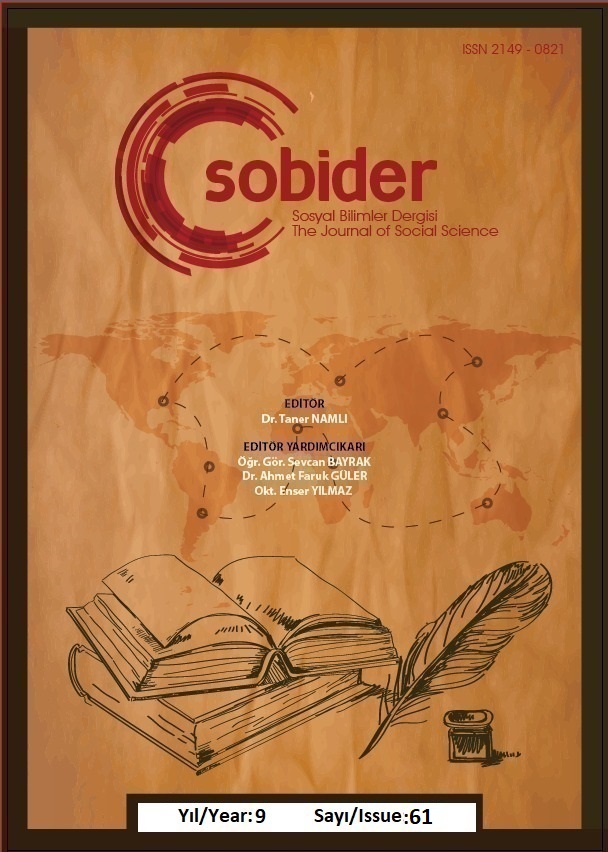TÜRKİYEDEKİ KONSERVATUVARLARDA TÜRK HALK MÜZİĞİ SES EĞİTİMİ – YORUMLAMA – REPERTUVAR İLE İLGİLİ DERSLERİN İNCELENMESİNE YÖNELİK BİR ÇALIŞMA
Author :
Abstract
Bu araştırma lisans düzeyinde yürütülen Türk halk müziği ses eğitimi – yorumlama – repertuvar ile ilgili derslerin öğretim programlarında teori, uygulama açısından nasıl yer aldığı ve uzman görüşleri ile birlikte ilgili derslerin yöntem kazanım durumlarını ortaya koymayı amaçlamaktadır. Araştırmada Türk halk müziği ses eğitimi – yorumlama – repertuvar ile ilgili dersleri yürüten uzmanlara öğretim programlarının ders tanım ve içerikleri, derste uyguladıkları yöntem ve kazanım durumları ve ders ile ilgili önerilerini içeren yapılandırılmış görüşme formu uygulanmıştır. Araştırma, Türk halk müziği ses eğitimi – yorumlama – repertuvar ile ilgili derslerin bulunduğu 6 devlet konservatuvarın 2019-2020 eğitim öğretim yılı ve öğretim programları ile sınırlandırılmıştır. Araştırmadan elde edilen verilere göre Türk halk müziği ses eğitimi – yorumlama – repertuvar ile ilgili derslerin bulunduğu konservatuvarlarda, konservatuvar isimlerindeki farklılıklar, ders isim, tanım ve içerik olarak öğrenci bilgi sisteminde yer alan tanımlamalarla, uzmanların verdikleri cevapların aynı gibi görünse de farklılık gösterdiği, ele alınan Türk halk müziği ile ilgili ses eğitimi, yorumlama ve repertuvar gibi derslerin teori uygulama ve kredi bakımından aynı olmadığı, belirtilen derslerin bir kısmının birebir aynı alanlardan mezun olmayan uzmanlar tarafından yürütüldüğü tespit edilmiştir. Derslerin işlendiği salonların fiziki olarak yetersizliği, ihtiyaç duyulan müzik kayıt sistemleri ve cihazlarının eksikliği, konservatuvarların bulunduğu konum itibariyle eşit imkan ve olanaklara sahip olmadıkları, dönem sonu veya yıl sonu konser ve etkinliklerin her konservatuvarda farklılıklar gösterdiği sonuçlarına ulaşılmıştır. Bu sonuçlar doğrultusunda çeşitli öneriler sunulmuştur.
Keywords
Abstract
This research aims to reveal how the courses related to Turkish folk music vocal education – interpretation – repertoire conducted at the undergraduate level are included in the curriculum in terms of theory and practice, and the method acquisition status of the related courses together with expert opinions. In the research, a structured interview form was applied to the experts who teach Turkish folk music vocal education - interpretation - repertoire, which includes the course definitions and contents of the curriculum, the methods they apply in the course and the learning outcomes, and their suggestions about the course. The research has been limited to the 2019-2020 academic year and education programs of 6 state conservatories, which have courses on Turkish folk music vocal education - interpretation - repertoire. According to the data obtained from the research, in conservatories where there are courses on Turkish folk music vocal education - interpretation - repertoire, the differences in the names of the conservatories, the definitions in the student information system in terms of course name, definition and content, although the answers given by the experts seem the same, differ. It has been determined that courses such as voice training, interpretation and repertoire related to Turkish folk music are not the same in terms of theory, practice and credit, and that some of the mentioned courses are conducted by experts who are not graduated from the same fields. It has been concluded that the physical insufficiency of the halls where the lectures are held, the lack of needed music recording systems and equipment, the conservatories do not have equal opportunities and facilities due to their location, and the concerts and events at the end of the semester or at the end of the year show differences in each conservatory. In line with these results, various suggestions were presented.
Keywords
- Büyükyıldız, H. Z. (2015). Türk Halk Müziği-Ulusal Türk Müziği, (1. Baskı). İstanbul: Lord Maatbacılık.
- Eroğlu, E. (2011). Halk Bilimi Yüksek Lisans Ders Notları, Sakarya.
- Hoşsu, M. (1997). Geleneksel Türk Halk Müziği Nazariyatı, İzmir: Kombassan A.Ş.
- Karakuş, G. (2016). Geleneksel Türk Sanat Müziğinin Türk Halk Müziğiyle Karşılaştırarak İncelenmesi, Yüksek Lisans Tezi, Adıyaman Üniversitesi.
- Kıral B. (2020). Nitel Bir Veri Analizi Yöntemi Olarak Doküman Analizi, Siirt Üniversitesi Sosyal Bilimler Enstitüsü Dergisi, Sayı 15
- Say, A. (1985). Müzik Ansiklopedisi, Cilt: 2, Ankara.
- Şanlı, Y. (2007). Türk Müziği Dizileri ve Solfeji-1, Ankara: Marj Ajans.
- Yıldırım, A. ve Şimşek, H. (2004). Sosyal Bilimlerde Nitel Araştırma Yöntemleri, (4. Baskı). Ankara: Seçkin Yayıncılık.
- Büyüköztürk, Ş., Çakmak, E.K., Akgün, Ö.E., Karadeniz, Ş., Demirel, F. (2011). Bilimsel Araştırma Yöntemleri, Pegem Akademi 8. Baskı
